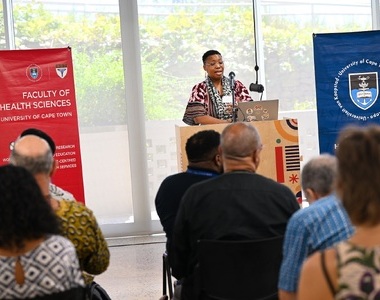UCT to co-lead four Africa–Europe Clusters of Research Excellence
20 June 2023 | Story Supplied. Photo Je’nine May. Read time 6 min.
The University of Cape Town (UCT) will co-lead four of the recently launched 17 Africa–Europe Clusters of Research Excellence (CoRE), an initiative that will address head-on the inequity that has characterised research in relation to Africa, to the detriment of global science.
Announced on 19 June, following the ARUA–The Guild summit in Brussels, Belgium on 8 June, the initiative will pioneer new approaches to equitable collaboration to tackle societal challenges through research that drives scientific and societal impact.
The four clusters co-led by UCT will also address issues relating to food and public health; non-communicable diseases and associated multi-morbidities; climate change; and inequality and poverty. UCT has also been announced as a partner in a further three clusters centred on water resources, pandemic response, and infectious diseases.
Foregrounding equity
The research clusters aim to transform the nature of collaborative research, foregrounding equity as a precondition for excellent and impactful research to address common societal challenges.
The CoRE, which is led by the African Research Universities Alliance (ARUA) and The Guild of Research-Intensive European Universities (The Guild), brings together distinguished researchers from universities and research institutes across both continents, from ARUA, The Guild and beyond the two networks. Each addresses a key societal challenge, framed by the Global Gateway’s AU–EU Innovation Agenda, in the context of local perspectives to ensure maximum scientific and societal impact.
“These crucial research clusters are set to make a meaningful contribution towards tackling key issues affecting our continent.”
UCT Deputy Vice-Chancellor for Research and Internationalisation Professor Sue Harrison said: “We are pleased that these teams of UCT academics have been part of conceptualising the challenge-driven research clusters from the ground up with colleagues from across Africa and Europe.
“These crucial research clusters are set to make a meaningful contribution towards tackling key issues affecting our continent, through capacity building, generating new knowledge and informing policy and practice. These are important platforms through which our researchers can contribute to societal impact in both Africa and Europe.”
The four clusters to be co-led by UCT are:
- Food environment actions for the Promotion of Public Health – co-led at UCT by Dr Jane Battersby (Department of Environmental & Geographical Science), with The Guild co-lead university being Uppsala University (Sweden).
- Non-communicable diseases and multi-morbidity – co-led at UCT by Professor Ntobeko Ntusi (Department of Medicine), with Université Paris Cité (France), University of Glasgow (Scotland), Jagiellonian University (Poland), Université Cheikh Anta Diop (Senegal), University of Ibadan (Nigeria) and University of Nairobi (Kenya).
- Nature-based solutions for climate change – co-led at UCT by Professor Mark New (African Climate and Development Initiative) and Professor Guy Midgely at Stellenbosch University, and The Guild co-lead university is Università di Bologna (Italy).
- Collaborative excellence for equity: Promoting impactful research and education on inequalities, poverty and deprivation across Africa – co-led at UCT by Professor Murray Leibbrandt (Southern Africa Labour and Development Research Unit) with the University of Groningen (Netherlands) as The Guild co-lead university.
UCT is a partner in the following three clusters:
- Pandemic preparedness and response – with Professor Lucy Gilson (School of Public Health and Family Medicine) leading UCT’s involvement.
- Water resources management - with Associate Professor Kirsty Carden (Future Water Research Institute) leading UCT’s involvement.
- Advanced infectious diseases – with Professor Nicola Mulder (Computational Biology Division) leading UCT’s involvement.
Integrated approaches
The clusters were formed in the context of a clear and unequivocal support in the research and innovation sector, in Europe and Africa, to develop science collaboration equitably and sustainably, and the urgent demand to funders like the European Union to develop a more integrated approach that focuses on excellence and capacity-building.
To this end, the clusters aim to open up new dialogues with policymakers and funders in both continents and beyond, to identify ground-breaking solutions and create opportunities for investment in societal transformation.
Commenting on the development, Ernest Aryeetey, ARUA secretary-general, said: “The prevailing obstacles to effective and equitable partnerships between African and European researchers will diminish in significance as the Africa–Europe Clusters of Excellence do what they are expected to do.
“We will see a significant improvement in the quality of research and in the number of high-quality and impactful graduate students coming out of our universities.”
“The clusters have been developed on the basis of trust and shared values between African and European researchers, and this is going to be the reason for their success in the years ahead. I am very optimistic that we will see a significant improvement in the quality of research and in the number of high-quality and impactful graduate students coming out of our universities.”
Jan Palmowski, secretary-general of The Guild, said: “The leaders of the African Union and the European Union have identified research and education as a key part of the strategic relationship between both continents.
“The Africa–Europe Clusters of Research Excellence will make a major contribution to this vision becoming a reality. We hope they will act as an inspiration to other researchers and institutions, just as they inspired our researchers, to address our pressing societal challenges collaboratively and equitably, in a deeply unequal world.”
 This work is licensed under a Creative Commons Attribution-NoDerivatives 4.0 International License.
This work is licensed under a Creative Commons Attribution-NoDerivatives 4.0 International License.
Please view the republishing articles page for more information.






























































































































































































































































































































































































































































